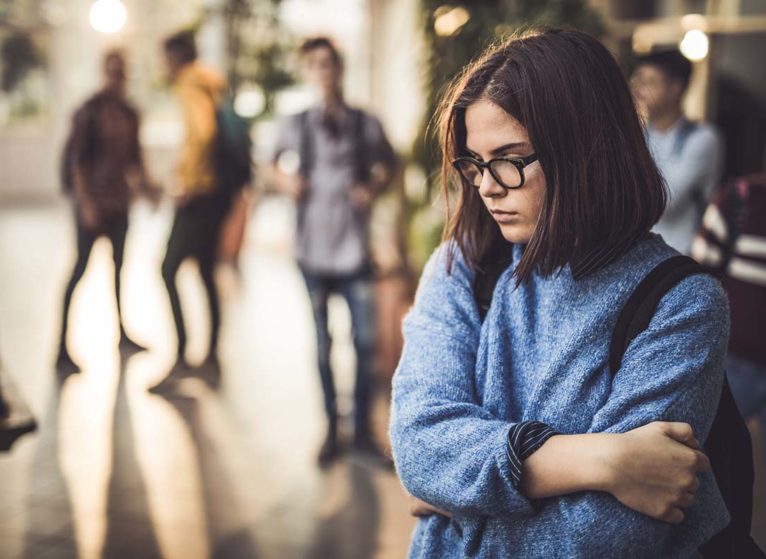The pandemic disrupted life for everyone. School closures, social isolation, loss of family income, and the death of loved ones. For teenagers, these hardships fueled greater anxiety, depression, and other mental health problems.
A national survey of high schoolers found that in 2021:
- 37% had mental health concerns
- 44% felt sad or hopeless
- LGBTQ+ youth reported poor mental health at higher levels
“Teenagers thrive on routine and social connections," says Haley Stephens, PhD, a pediatric psychologist at UVA Children’s. “And they need activities that boost their competency and self-esteem. Kids lost these during the pandemic. That leaves them more prone to mental health problems.”
A National Crisis: Teenage Mental Health Is a Serious Concern
Even before the pandemic, teenage mental health was a growing concern. About 1 in 5 youth had a mental health disorder. Only 20% of these children received professional care. Suicide is the second leading cause of death among youth, according to the Centers for Disease Control and Prevention (CDC). Over the past two years, the teenage mental health crisis worsened.
“Many teenagers have returned to school and are getting back to normal activities. But the pandemic's impact will linger,” says Laura Shaffer, PhD, section chief of pediatric psychology. “The mental health fallout from disasters like the 9/11 attacks and Hurricane Katrina lasted up to 10 years. We must support our teens and their families for decades to come.”
In the wake of COVID-19, more teenagers have seen mental health professionals for:
- Anxiety
- Depression
- Eating disorders
- Grief (Over 200,000 U.S. children lost a primary caregiver to COVID-19.)
Left unchecked, mental illness can affect physical well-being, academic performance, and decision-making. They also may drive risky behaviors, including substance abuse and unsafe sex.
Mental health disorders in teenagers respond best to treatment if caught early. The U.S. Preventive Services Task Force says all youth ages 8 to 18 should be screened regularly for anxiety.
A Rise in Abuse and Neglect
Home isn’t always a safe haven for kids. Family stress intensified during the pandemic. More adolescents and teens experienced abuse and neglect.
The CDC survey found that:
- 55% of teens were emotionally abused by a parent or other adult at home
- 11% were physically abused by a parent or other adult at home
- LBGTQ youth had higher rates of abuse than their peers
Claudia Allen, PhD, UVA Family Stress Clinic
Social Media Use During COVID
Teenagers thrive on social interaction, especially with peers. When schools closed, they became more isolated. More than ever, teenagers turned to social media to stay connected with friends. Often, this was positive. But social media can be harmful for adolescents who experience cyber bullying. More time on social media also makes teens vulnerable to judgment and criticism. They also may compare themselves to others. All of this can worsen teenage mental health.
“Online friendships can be great. But face-to-face contact improves mood,” says Claudia Allen, PhD, director of the UVA Family Stress Clinic. She's also director of behavioral science in the UVA Department of Family Medicine. “They're not a substitute for in-person interactions.”
Loss of Milestones IMpact Teenage Mental Health
Teenagers lost two critical years of personal growth and academic development. During the normal high school experience, student responsibilities increase gradually. But educators were more lenient with deadlines during the pandemic. As students returned to school in person, greater expectations overwhelmed them.
“Teenagers have gotten out of practice,” Allen says. “Shifting back to in-person school has been positive. Most kids are glad to be back with their friends and to have the normal school day. But it's also been a big change.”
Worried about your teen's mental health?
The UVA Family Stress Clinic offers therapy for children, teens, & adults. We have translation services for non-English speaking patients. We can coordinate care with your medical team.
Warning Signs: Recognizing Mental Health Distress in Teenagers
How do you know if your teen’s struggling with their mental health? Here are some signs that they may need help:
- Withdrawal from activities they usually enjoy
- Avoiding friends and family
- Falling grades
- Moodiness, irritability, or anger that seems out of character
- Change in sleep patterns (increased or decreased)
- Disordered eating (restricting food, binging, or other problems)
Supporting Your Teenager’s Mental Health
Good mental health is the foundation for teenagers' wellbeing and resilience. You can support your child's development by building a strong, loving relationship. Here are ways to do that:
- Establish a routine. Build a daily schedule around key activities such as school. Set a predictable time for meals. Wake up and go to bed at the same time each day.
- Spend time together. Eat meals at the family dinner table. Do fun things together, such as playing games, watching a movie, or going for a bike ride.
- Model self-care. Show your child how to live well. Take care of yourself by practicing good eating and sleeping habits. Exercise and spend time outside each day. Stay in touch with family and friends.
- Listen to your teen. Ask them questions about school and their friends. Check in with their feelings. Be open and nonjudgmental, even if your child is doing something you don’t like. Praise and encourage them for something they are doing well.
- Don’t dismiss talk of suicide. If your child says they have suicidal thoughts, take action. Contact a mental health provider to have your teenager or child evaluated. Remove weapons and ammunition from your home. Store medications in a locked cabinet. If your teenager is in immediate danger, take them to the local emergency room. Or contact the suicide hotline at 1-800-273-TALK for support.



The insights into COVID’s impact on teenage mental health are eye-opening and concerning. It’s crucial to address these issues and provide support to our youth during such challenging times. Thank you for sharing.